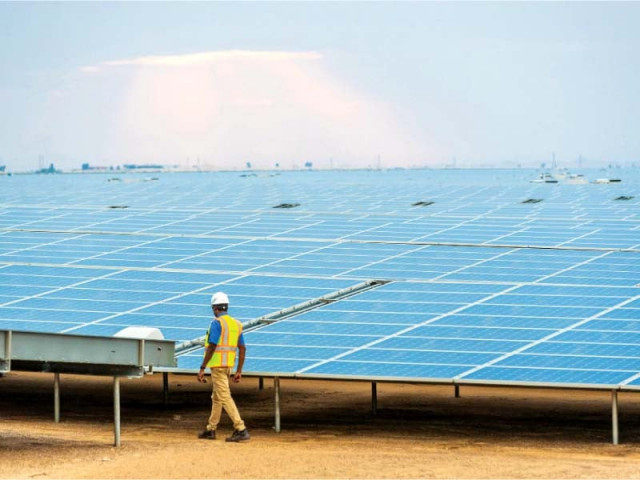Can Pakistan capitalise on solar as it becomes popular
To unlock benefits, country must address challenges related to financing, grid infrastructure

In a remarkable turning point, IEA (International Energy Agency) reported solar energy is set to attract more capital investment than traditional oil for the first time ever.
This significant shift in the global energy landscape holds profound implications for Pakistan’s power production and its dependencies on electricity.
Pakistan has witnessed substantial growth in power generation capacity in recent years. According to the State Bank of Pakistan (SBP), the total installed capacity reached approximately 43,775 megawatts (MW) in FY22.
Fossil fuels, including oil, gas, and coal, account for a significant portion of the country’s power generation, with a combined capacity of around 26,683 MW. However, renewable energy sources, particularly solar and wind, have gained momentum, contributing to the diversification of Pakistan’s energy mix.
Solar power installations have seen remarkable growth, with an installed capacity of over 2,368 MW as of FY22, reflecting the rising popularity and potential of solar energy.
In recent years, Pakistan has witnessed substantial investments in solar power projects, both domestic and foreign. It has introduced a financing scheme for renewable energy to make financing available for consumers in the private sector to invest in renewable electricity generation. Until February 2022, SBP had provided Rs74 billion (about $400 million) in financing to over 1,175 projects with a combined capacity of 1,375 MW in renewable energy.
The World Bank also reports that Pakistan has a potential of 40 GW of solar power and has set a target of achieving 20% of its electricity from renewable sources by 2025.
Pakistan has been heavily reliant on fossil fuels, particularly oil and gas, for power generation. However, the power production mix has undergone some changes in recent years.
According to the Pakistan Bureau of Statistics (PBS), as of 2020, fossil fuels accounted for approximately 63% of the total power generation, followed by hydropower at 29%, nuclear energy at 5%, and renewable energy at around 3%.
Despite its vast potential for solar energy, Pakistan has only scratched the surface of its capabilities. The country is blessed with abundant sunshine, making it an ideal location for solar power generation. Pakistan’s government, recognising the importance of renewable energy, has introduced favourable policies and incentives to promote solar energy development. The Alternative Energy Development Board (AEDB) offers net metering and feed-in tariffs to encourage residential and commercial solar installations.
The increasing attractiveness of solar energy is expected to drive significant capital investment in Pakistan. Foreign direct investment (FDI) in the renewable energy sector has already been on the rise. Solar projects, including large-scale solar farms and distributed solar installations, offer lucrative investment opportunities. The China-Pakistan Economic Corridor (CPEC) has also played a crucial role in fostering solar energy cooperation between the two countries.
Several challenges need to be addressed to fully harness Pakistan’s solar energy potential. These challenges include the high initial costs of solar installations, limited access to financing, lack of awareness about solar energy benefits, and inadequate grid infrastructure.
To overcome these obstacles, the current government is working on a new 25-year energy policy that seeks to have 20-30% of all energy derived from renewable energy sources by 2030. The policy also aims to reduce dependence on imported fuel products and increase the share of indigenous resources.
The current government has approved the Alternative and Renewable Energy Policy 2019, which provides incentives and facilitation for renewable energy projects. The previous government also faced challenges in implementing the National Electricity Policy 2021, which was approved by the Council of Common Interests in February 2021.
The policy aimed to ensure affordable, reliable and sustainable electricity supply for all consumers, but faced resistance from some provinces and stakeholders over issues such as tariff determination, power sector governance and distribution reforms. The shift towards solar energy as an attractive investment option signifies a significant turning point in Pakistan’s power production landscape. The country has ample solar resources that can be harnessed to reduce its dependence on fossil fuels, enhance energy security, and contribute to environmental sustainability.
With supportive government policies, increased foreign investment, and technological advancements, solar energy has the potential to revolutionise Pakistan’s power generation sector.
To fully unlock the benefits of solar energy, Pakistan must address challenges related to financing, awareness, and grid infrastructure. Encouraging the private sector’s participation, facilitating easy access to financing options, and raising awareness about the long-term benefits of solar energy will be the key to promoting its adoption across residential, commercial, and industrial sectors.
Furthermore, investing in grid infrastructure upgrades, including energy storage solutions, will ensure a seamless integration of solar power into the national grid. As solar energy attracts more capital than oil for the first time ever, Pakistan stands at a crucial juncture. By embracing the potential of solar energy and implementing the necessary measures, Pakistan can secure a sustainable, clean, and reliable energy future while reaping the economic benefits that come with the global shift towards renewable energy sources.
The writer is a member of PEC and has done Master’s in Engineering
Published in The Express Tribune, June 5th, 2023.
Like Business on Facebook, follow @TribuneBiz on Twitter to stay informed and join in the conversation.



















COMMENTS
Comments are moderated and generally will be posted if they are on-topic and not abusive.
For more information, please see our Comments FAQ